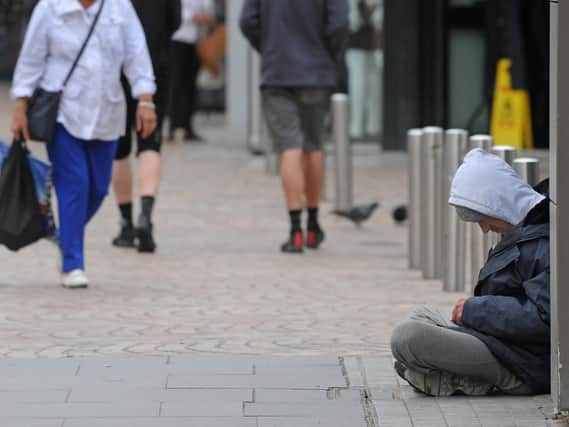Should you give money to street beggars? What police and charities say


While many will proudly give as much as they can to those begging on the streets, should you hand over your money?
This is what a homeless charity says
Advertisement
Hide AdAdvertisement
Hide AdThames Reach, a homeless charity based in London, says that those begging on the streets are often supporting a hard drug habit.
A spokesman said: "Overwhelming evidence shows that people who beg on the streets of England do so in order to buy hard drugs, particularly crack cocaine and heroin, and super-strength alcoholic beers and ciders.
"These highly addictive drugs cause an extreme deterioration in people’s health and even death.
"This evidence comes from a number of sources. Firstly, Thames Reach’s outreach teams, including its London Street Rescue service, who are out and about on the streets of the capital working with London’s homeless 365 days of the year.
Advertisement
Hide AdAdvertisement
Hide Ad"They estimate that 80 per cent of people begging do so to support a drug habit.
"Secondly, when the Metropolitan Police did some drug testing of people arrested for begging, the figures indicated that between 70 and 80 per cent tested positive for Class A drugs.
"Most recently, in a police crackdown in Birmingham on begging in autumn 2013, every single one of the 40 people arrested failed a drug test.
Advertisement
Hide AdAdvertisement
Hide Ad"The evidence is indisputable that the overwhelming majority of people begging on the streets of England spend their begging money on crack cocaine and heroin."
What police say
South Yorkshire Police's Deputy Chief Constable Mark Roberts said the issue has also been felt in Sheffield.
He said: "Sadly a small number of people in Sheffield city centre choose to beg passers-by for money, often to feed an underlying issue with drugs or drink.
"Visitors and business owners report feeling intimidated by the beggars’ actions and the unwanted attention. This, in part, is why we are here with our partners to steer beggars away from the street and towards the help and advice available from support services.
Advertisement
Hide AdAdvertisement
Hide Ad"Those begging are often vulnerable and signposting them to social services and charity is the preferred option. But we are also committed to taking enforcement action against those who won’t engage with the support that is available from partner agencies."
So, police and charities say, the best way to support the homeless is to give your money or time to homeless charities and shelters rather than directly to street beggars.
What West Yorkshire Police can do to tackle anti-social behaviour, including begging
Advertisement
Hide AdAdvertisement
Hide AdAcceptable Behaviour Contracts (ABCs) - where an individual recognises the effect their behaviour has on others and agrees to stop. This may be offered with support to help them do this.Criminal Behaviour Orders (CBOs) – court orders to tackle persistently anti-social individuals convicted of an offence. Breaching a CBO can lead to up to five years in prison and / or a fine of up to £5,000.
Closure Powers - shutting down premises being used or likely to be used to cause nuisance or disorder. Closures can last for up to six months. Breaching a Closure Order can lead to up to 6 months in prison and / or a fine
Designated Public Place Orders - to limit drinking of alcohol in a set area. Alcohol can be confiscated and anyone refusing to cooperate can be arrested. The penalty is a £50 fine or being banned from drinking in public.
Public Space Protection Orders – to deal with particular anti-social behaviour in a public space. Failure to comply can result in a Fixed Penalty Notice or court fine.
Advertisement
Hide AdAdvertisement
Hide AdFixed Penalty Notices and Penalty Notices (fines) - can be used by police officers, PCSOs and accredited council officers to impose fines of up to £80 for causing a nuisance.
Dispersal Orders - can be used to move people away from a particular area if there is, or is likely to be anti-social behaviour, crime or disorder. People under 16 years of age can also be returned home. Failure to comply can result in 3 months in prison and / or a fine.
Community Protection Notices (CPNs) – to stop a person, business or organisation committing anti-social behaviour ,and deal with particular ongoing problems or nuisance. Failure to comply can lead to sanctions including a Fixed Penalty Notice and / or forfeiture.